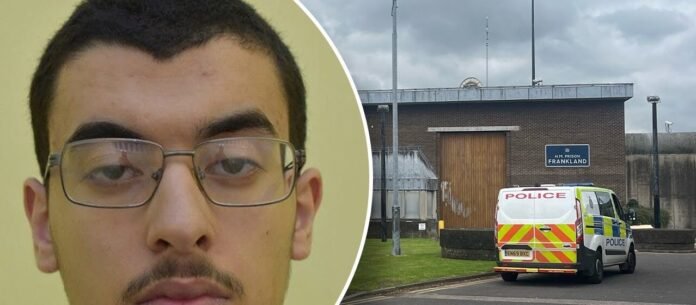Hashem Abedi, jailed for aiding his brother’s 2017 terror bombing, allegedly stabbed and burned officers in a brutal assault at HMP Frankland
Three prison officers at HMP Frankland are suffering life-changing injuries after a savage attack allegedly carried out by Hashem Abedi, the brother of Manchester Arena bomber Salman Abedi. The shocking incident has triggered renewed calls for urgent safety reforms inside high-risk prison wings.
Abedi, 28, is currently serving a 55-year sentence for his role in the 2017 terror attack which killed 22 people and injured hundreds. On Saturday, while detained in Frankland’s separation centre—a high-security unit reserved for dangerous extremists—he reportedly launched a planned assault using improvised weapons made from kitchen equipment.
According to the Prison Officers’ Association (POA), Abedi stabbed one officer in the neck, severing an artery, and another in the back, puncturing a lung. All three victims were also burned with hot oil, believed to be heated butter sachets stockpiled by Abedi. Two of the injured officers remain hospitalised; one has since been discharged.
Mark Fairhurst, the POA’s national chairman, visited the prison and described the aftermath as “traumatising.” He told the Manchester Evening News, “They are traumatised, angry and fragile… two were very lucky to escape with their lives.”
The assailant is believed to have crafted two makeshift knives from a baking tray, exploiting access to cooking facilities in the separation centre. The POA is furious that such privileges were permitted for inmates held in the highest security tier.
“I’m absolutely furious that terrorist prisoners, who pose such a significant risk to national security, are allowed the same freedoms and privileges as prisoners on normal location,” Fairhurst said. “We should not be allowing prisoners in separation centres to access cooking facilities.”
Following the assault, the government has already met two of the POA’s demands: the removal of self-cooking facilities from separation and close supervision centres, and the launch of an independent review into the operation of these units.
But the union is not stopping there. Fairhurst has requested an urgent meeting with the Secretary of State for Justice to demand stab-proof vests and tasers for frontline prison staff. “If we had had a response unit with tasers during this incident, we could have subdued the attack a lot sooner,” he insisted.
The violent incident has now been handed over to Counter Terrorism Police, who are interviewing Abedi and investigating whether the assault will be classed as a terror-related offence. When asked whether Abedi acted alone, Fairhurst responded: “That is for the police to decide.”
He added, “This was an unprovoked, vicious, cowardly, abhorrent attack that has left three staff with life-changing injuries.”
The attack took place in one of the most secure areas of the prison estate. Frankland’s separation centre houses fewer than ten inmates, each deemed a high-risk extremist. Yet despite its design as a containment space for radicalised individuals, Abedi appears to have been able to weaponise everyday items and plan a coordinated attack.
Fairhurst emphasised the need to redefine how the prison system deals with inmates considered national security threats. “We all know the problems with the definition of terrorism… but whatever this is legally classified as, it was a horrific act of violence.”
The POA has long campaigned for enhanced safety gear, warning that prison staff face mounting dangers, particularly when managing radicalised or ideologically motivated offenders. This latest assault, they argue, proves the system is failing to protect its frontline personnel.
